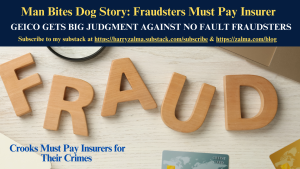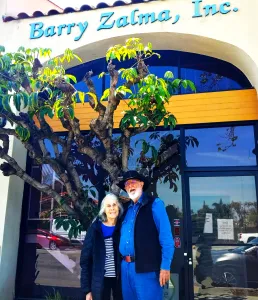Man Bites Dog Story: Fraudsters Must Pay Insurer

Post 4893
See the full video at https://rumble.com/v5feyzf-man-bites-dog-story-fraudsters-must-pay-insurer.html and at https://youtu.be/ksy8jzpFLhA
On August 4, 2022, Plaintiffs Government Employees Insurance Company, GEICO Indemnity Company, and various GEICO companies (collectively, “Plaintiffs”) commenced this action for common law fraud, unjust enrichment, aiding and abetting fraud, negligent misrepresentation, Civil RICO violations, and a declaratory judgment, alleging that Defendants schemed to submit fraudulent no-fault insurance claims.
Receiving no response to the suit Plaintiffs moved for default judgment on the common law fraud claim against Mr. St. Louis and 1 Brooklyn (collectively, the “Defaulting Defendants”).
In Government Employees Insurance Company, et al v. Wilkins Williams Medical, P.C., Eric St. Louis, 1 et al, No. 22-CV-4608 (KAM)(JRC), United States District Court, E.D. New York (September 6, 2024) the USDC entered default judgment.
FACTUAL BACKGROUND
New York enacted the Comprehensive Motor Vehicle Insurance Reparations Act (the “Act”), New York Insurance Law §§ 5101-5109, for prompt compensation for losses incurred by accident victims without regard to fault or negligence, to reduce the burden on the courts, and to provide substantial premium savings to New York motorists.
Plaintiffs underwrite automobile insurance in New York. Insured drivers can assign their rights to No-Fault Benefits, which include up to $50,000 for necessary expenses, to healthcare providers in exchange for healthcare services. Healthcare providers submit claims directly to insurance companies via “NF-3” or “HCFA-1500” forms, then receive payment for provided medical services. These forms contain warnings that filing claims with false information or concealing information is a crime. The No-Fault Laws state that a health care provider is ineligible to receive No-Fault Benefits if fraudulently licensed, if paying or receiving unlawful kickbacks for patient referrals, if permitting unlicensed laypersons to control or dictate treatments, or if allowing unlicensed laypersons to share fees for professional services.
THE ALLEGED SCHEME
Plaintiffs allege that Mr. St. Louis “holds himself out as a healthcare industry practice manager and operator of various healthcare offices but are, in actuality, organized to supply convenient, one-stop shops for no-fault insurance fraud”.
Plaintiffs alleged that the Defaulting Defendants ran a scheme that systematically submitted fraudulent no-fault claims to Plaintiffs for unnecessary medical services by illegally using the medical license, signature, and other relevant information from a Dr. Wilkins B. Williams (“Dr. Williams”) and by illegally controlling Williams Medical.
The Defaulting Defendants, in coordination with the John Doe Defendants, created the claim paperwork to bill for fraudulent services. The Defaulting Defendants created a stamp with the name of Williams Medical, Dr. Williams’s National Provider Identifier number, and medical license number, then placed the stamp on Assignment of Benefit (“AOB”) and medical record forms, with Dr. Williams’s forged signature, to misrepresent that Dr. Williams performed the services. The Defaulting Defendants worked with the Lawyer Defendants to provide billing and collection services for the fraudulent services.
DISCUSSION
Finding that Mr. St. Louis was properly served the Court concluded it has personal jurisdiction over him. As to 1 Brooklyn and Mr. St. Louis, Plaintiffs filed an affidavit demonstrating they were properly served the Summons and Amended Complaint.
LIABILITY
To state a claim for fraud under New York law, a plaintiff must allege (1) a material misrepresentation or omission of fact; (2) which the defendant knew to be false; (3) which the defendant made with the intent to defraud; (4) upon which the plaintiff reasonably relied; and (5) which caused injury to the plaintiff and also requires allegations of fraud be pleaded with specificity, which requires that the plaintiff (1) detail the statements (or omissions) that the plaintiff contends are fraudulent, (2) identify the speaker, (3) state where and when the statements (or omissions) were made, and (4) explain why the statements (or omissions) are fraudulent.
Material Misrepresentations or Omissions of Fact
Plaintiffs sufficiently alleged the Defaulting Defendants knew the submitted claims were false. The allegations sufficiently demonstrated the Defaulting Defendants knew the claims were false.
Further, Plaintiffs sufficiently alleged that the Defaulting Defendants’ conduct, on which Plaintiffs reasonably relied, caused Plaintiffs to pay $542,374.05 for fraudulent bills submitted through Williams Medical.
REQUESTED RELIEF
Unchallenged facts established the defendant’s liability, the court determined the amount of damages due.
Prejudgment Interest
New York law provides for the award of prejudgment interest on damages, computed from the earliest ascertainable date the cause of action existed. In the insurance fraud context, prejudgment interest accrues from the date the insurance company makes payment.
The Court found that granting pre-judgment interest beginning the first day of the first quarter following when Plaintiffs made payments is permissible. The Defaulting Defendants presently owe Plaintiffs $91,048.42 in prejudgment interest on a $542,374.05 total paid to Williams Medical.
Joint and Several Liability
In a scheme where there are repeated fraudulent acts by multiple defendants, plaintiffs are entitled to recover once for every fraudulent act, and each defendant who participated in the fraudulent act is jointly and severally liable for the amount of damage caused. The Defaulting Defendants are jointly and severally liable for damages.
Conclusion
Plaintiffs demonstrated that the Defaulting Defendants are liable for common law fraud. Therefore the Court entered judgment in favor of Plaintiffs and against the Defaulting Defendants: (1) $542,374.05 in compensatory damages; and (2) $91,048.42 in prejudgment interest, plus $33,301.26 ($133.74 per day between January 1, 2024, and today, September 6, 2024, the date of the Clerk of Court’s entry of final judgment), for a total of $124,349.68. Should the date of judgment be beyond September 6, 2024, the Clerk of Court should be directed to add additional interest of $133.74 per additional day from September 6, 2024, through the date of judgment. Moreover, post-judgment interest shall accrue from the date of entry of judgment as provided in 28 U.S.C. § 1961.
The judgment may have an effect on the community of fraudsters taking advantage of insurers writing auto insurance in New York by taking the profit out of the crime. Since this is a default judgment GEICO will probably have a difficult time collecting the judgment it will chill the others trying to defraud insurers in New York. The finding might even make it possible for the US Attorney and the state and local prosecutors to prosecute the crime. Since there was no prosecution GEICO must be commended for its proactive effort to stop fraud.
 (c) 2024 Barry Zalma & ClaimSchool, Inc.
(c) 2024 Barry Zalma & ClaimSchool, Inc.
Please tell your friends and colleagues about this blog and the videos and let them subscribe to the blog and the videos.
Subscribe to my substack at https://barryzalma.substack.com/subscribe
Go to X @bzalma; Go to Newsbreak.com https://www.newsbreak.com/@c/1653419?s=01; Go to Barry Zalma videos at Rumble.com at https://rumble.com/account/content?type=all; Go to Barry Zalma on YouTube- https://www.youtube.com/channel/UCysiZklEtxZsSF9DfC0Expg
Go to the Insurance Claims Library – https://lnkd.in/gwEYk
Like this:
Loading…







